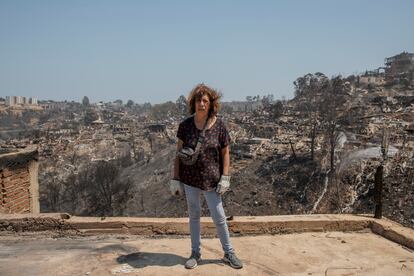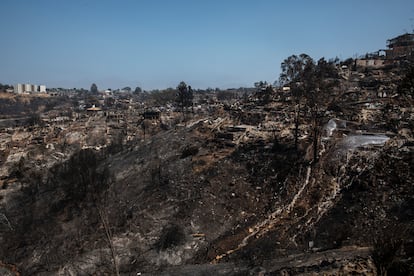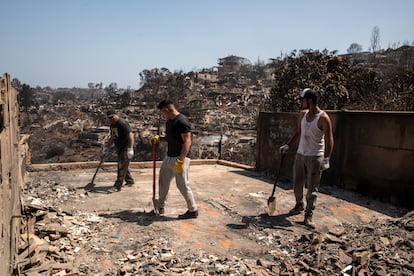The epicenter of the catastrophe in Chile: ‘It’s as if a nuclear bomb fell and destroyed us all’
In El Olivar, one of the towns devastated by the fires in Viña del Mar, residents take turns on watch at night to prevent new outbreaks of arson or looting


At the top of a hill in Viña del Mar stands Olivar Alto: a working-class town that saw its memories disappear in the flames. In one of the areas worst-affected by the fires in south-central Chile, only the skeletons of its semi-detached houses, a pile of rubble, and the desperation of its people remain, particularly those on Chumisa Street. They lost at least six of their neighbors — from the current toll of 123 fatalities — most of their pets and, according to those consulted by this newspaper, no authority has yet offered help four days after the tragedy. Anxiety increases at night due to the threat of new outbreaks of arson or looting. “They want to steal our ashes,” laments 19-year-old Josefa Cornejo, her face and body covered in soot.
On Monday night, the residents organized themselves to take turns on watch. Some had been robbed of gallons of gas and copper cables, and the news had reported that people were deliberately starting fires in the area, although no one has been arrested. Nicole Martínez, a 30-year-old mother of two, was one of the four volunteers on watch. They saw, she recounts, an intruder attempting to set fire to one of the few trees still standing on a devastated hill. Theories as to who it was abound. The more desperate the resident, the more serious the accusation.
The only consensus among the residents of Olivar Alto is that they want the police and military to patrol at night to protect them. That they have enough on their plates. That they need them. As for material aid, they complain that it only reaches the lower sector of the hill.

“Neighbor, do you want me to paint your house number?” asks a young woman with a tub of paint. “It’s so that when they come to do the cadaster they know whose house it is,” she explains.
Lucy Castañeda, a 61-year-old widow, removes the rubble of the home where had she lived for the last 33 years with a shovel. The place where her son was born, where she lost her husband, and where she fulfilled her dream of owning her own home. Relatives and neighbors help her in the arduous task. They all know each other. Castañeda is carer to an 80-year-old aunt, which forces her to go back and forth to the disaster area. Her family made it out with the fire on their heels and burning ashes falling from the sky, she says. She pulled out her granddaughter and her son rescued her aunt. “It’s as if a nuclear bomb fell and destroyed us all. So many neighbors died... we are alive, but we have nothing, nothing, not even my documents,” she says from what used to be the patio of her house, but is now a lump of cement.
Most of those interviewed moved to a relative’s house after the disaster. Others remain, to watch over what they have left as best they can. “My son comes to stand guard because at night, this becomes a no-man’s land. Last night they came to set fires again, and all of a sudden, they start shooting,” says Castañeda. The only thing she urges is for the authorities to remove the debris outside the charred houses, from which the smell of decomposition emanates, giving the place the sensation of a war zone.
Elizabeth Cabezas, a 47-year-old secretary, is also waiting for specialists to be sent to assess whether it is possible to rebuild on what is left of her house, or whether it should be demolished. She had lived there since 1988, when the first buildings promised under the government project led by the Ministry of Housing and City Planning were delivered. The fires caught her on vacation and a friend sent her the news: “Your house is not gone, but your street is,” she told her. She lists all the neighbors she lost, most of them elderly people who were left behind during the evacuation. Several managed to get into their cars to escape, but in an area of narrow roads, there was a bottleneck from which not everyone managed to get out.

Carla Victoriano, 41, an employee of a customs agency, has her 18-month-old son sleeping inside what little is left of her house. She has nowhere else to leave him while she cleans her building. The main help she received came from members of the Santiago Wanderers soccer team, who came to the area as volunteers. The image of young people with shovels, rakes, and sacks walking from the road to the top of the hills is a recurring scene these days in Viña del Mar. The residents insist it has been fellow citizens, and not the authorities, who have provided the most assistance. But when night falls, they leave. And those affected, they say, are left to fend for themselves.
Sign up for our weekly newsletter to get more English-language news coverage from EL PAÍS USA Edition
Tu suscripción se está usando en otro dispositivo
¿Quieres añadir otro usuario a tu suscripción?
Si continúas leyendo en este dispositivo, no se podrá leer en el otro.
FlechaTu suscripción se está usando en otro dispositivo y solo puedes acceder a EL PAÍS desde un dispositivo a la vez.
Si quieres compartir tu cuenta, cambia tu suscripción a la modalidad Premium, así podrás añadir otro usuario. Cada uno accederá con su propia cuenta de email, lo que os permitirá personalizar vuestra experiencia en EL PAÍS.
¿Tienes una suscripción de empresa? Accede aquí para contratar más cuentas.
En el caso de no saber quién está usando tu cuenta, te recomendamos cambiar tu contraseña aquí.
Si decides continuar compartiendo tu cuenta, este mensaje se mostrará en tu dispositivo y en el de la otra persona que está usando tu cuenta de forma indefinida, afectando a tu experiencia de lectura. Puedes consultar aquí los términos y condiciones de la suscripción digital.








































